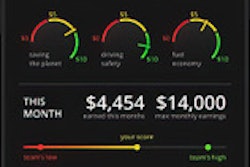Trucking and logistics companies have reached a crossroads. They have lots of data, but protecting razor-thin margins requires moving it faster and more accurately through pricing, order entry, planning, execution, settlements, billing, and other routine functions.
Artificial intelligence (AI) accelerates processes that historically required human interaction. Generative AI is the next frontier. By applying large language models, it can quickly sort through information, make predictions, and give answers in a human-like voice. It burst onto the scene in late 2022 when research company Open AI released ChatGPT. Since then, everyone from the C-suite to the driver’s seat has considered its impact on business and their careers.
Trucking’s AI arms race
The rapid advancement of AI has led researcher and innovation consultant Christoph Burkhardt to talk of a paradigm shift. At the Transportation Intermediaries Association's conference on April 11 in Scottsdale, Ariz., he said the first major industrial shift was electrified factories, followed by digitized systems. “Cognified” machines augmenting human intelligence comes next.
Transportation companies are rolling out various AI-powered machines with human-like functions like dash cameras that detect and alert drivers to risky behaviors. These “AI point solutions,” he said, are precursors to disruptive system changes like autonomous trucks.
Taking a wait-and-see approach to AI could be detrimental to survival. The AI arms race is on, and companies have many options to create an advantage. Below are four areas where AI-powered systems can make an immediate difference.
Order management
A 2024 Forbes Advisor survey found that most businesses (53%) use AI to improve production processes. In transportation and logistics, production starts with receiving load offers. While orders no longer come from fax machines, Internet-based order delivery systems are not always more efficient.
Motor carriers and freight brokers regularly use humans to process orders received through unstructured data formats like emails and phone calls. AI-powered solutions can transform order management by accepting data in any format and automating rating, acceptance, customer responses, and other front-end tasks.
Truckload carriers that digitize their front end can also use AI-powered systems to secure freight more swiftly than others stuck in manual review loops; know if you are meeting, exceeding, or falling short of customer commitments; and utilize insights such as network balance metrics and profitability ratings to inform decisions to accept or decline orders.
Load planning
The Forbes Advisor survey of businesses also shows that AI is perceived as an asset for improving decision-making (44%), decreasing response times (53%), and avoiding mistakes (48%). These benefits are sorely needed in chaotic and unpredictable truckload planning.
Inevitably, companies have more freight than capacity, and vice versa, in key markets on any given day. Uncertainty drives up costs and contributes to lost opportunities.
New AI-powered systems can forecast network balance to enable proactive load planning, giving users accurate, relevant, and timely decision support to improve bottom-line results. For example, an AI-powered load planning function that forecasts network balance up to 5 days in advance helps planners mitigate potential oversold or undersold markets by proactively generating revenue and minimizing deadhead by allocating resources to over- and undersold markets; repositioning resources based on future loads and capacity fluctuations, shifting network balancing from a cost center to a profit driver; and providing greater transparency to drivers and increasing their earnings by pre-planning load assignments.
Customer service
The same 2024 Forbes Advisor survey found that nearly two-thirds (64%) of business owners believe AI will improve customer relationships. AI-powered chatbots present a logical solution for handling customer inquiries, but they also have drawbacks.
Some trucking and logistics companies use chatbots to answer generic questions by instantly searching their databases. Chatbots can instantly access available information to answer questions. Still, companies are better served by using AI to support office employees with insights and tools that make managing interactions with customers and drivers easier.
AI-powered applications, such as web portals, can automate routine customer-facing functions like appointment scheduling and shipment tracking, providing instant answers to common questions, such as, “Where’s my shipment?” or, more importantly, “When will it arrive?”
Modern, SaaS-based platforms that deliver accurate shipment ETAs evaluate the complete chain of load events and status details, including drivers’ hours of service, weather, traffic, and historic dwell times for planned stops based on the day of the week and time of day. They also capture drivers’ trip plans to factor in planned stops for fuel and rest breaks.
Fraud prevention
An explosion in fraud is tampering with many of AI's benefits. Data security and privacy concerns are prevalent among businesses, with 31% of respondents to the Forbes Advisory survey expressing apprehensions in the age of AI.
The transportation industry has reasons to be concerned. According to CargoNet, reports of freight fraud more than quadrupled in 2023 from the year before, costing at least $500 million in estimated losses. Spoofing identities, doctoring documents, fraudulent load tracking, and other practices have become rampant.
One of the most common types of fraud is when individuals or entities impersonate legitimate carriers to steal or double-broker loads. Fraudsters can also infiltrate in-stream transactions to submit fake invoices and divert payments.
AI has become instrumental in cybersecurity by detecting anomalies humans cannot, such as suspicious online activity patterns. Motor carriers and freight brokers can prevent AI-driven fraud by using secure private networks and structured data formats to share load details and conduct transactions with customers and trusted business partners.
The key to success
AI is transforming trucking and logistics companies' operations, from synthesizing data and generating insights to automating processes and detecting fraud.
Ultimately, the successful adoption of AI hinges on using new technology as a force multiplier rather than a replacement for human labor. Organizations implementing AI-powered systems can build a competitive advantage by managing data more effectively and elevating people to more valuable and fulfilling roles.











